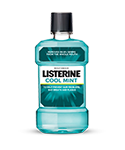Also known as periodontal disease, periodontitis is a more aggressive gum infection that can develop when gingivitis isn’t treated. Unlike gingivitis, periodontitis doesn’t just cause mildly tender, swollen, or bleeding gums . It’s a more aggressive disease that causes the gums and bone around your teeth to detach from the tooth roots. Over time, this leads to symptoms of:
Gum recession
Halitosis (bad breath)
Tartar buildup
SensitivityTooth mobility
Tooth loss
The causes of periodontitis are the same as those that lead to gum problems. Poor oral hygiene, smoking, and a general lack of dental care are typically to blame.

How Can I stay away from Periodontal Disease?
The best way to stay away from periodontitis is managing gum disease at the early signs of infection. It is essential to brush, floss and do a mouth rinse with a mouthwash like LISTERINE® twice daily which would help in reducing gum problems . Ensure you also visit your dentist for regular dental checkups.
Smokers should note that tobacco use often masks the symptoms of periodontal disease. Your gum tissues may appear healthy, even if they aren’t. Read more about the link with smoking and gum disease here.
The best treatment for any dental condition — including periodontitis — is prevention. Ask your dentist or hygienist for a periodontal exam at every checkup. This brief screening will detect areas where gums are detaching from the teeth, so that non-invasive therapies and better home care can prevent more aggressive stages of disease from developing.
Treatment for Periodontitis
Periodontal disease is a more aggressive form of gum infection that cannot be managed without professional treatment. While it’s still essential to practice good oral hygiene, you will need the help of a dentist to stop the infection in its tracks.
Most gum disease treatment plans will include a series of deep cleanings, or a periodontal scaling and root planing. These appointments will involve cleaning the tartar and plaque away from the root surfaces of your teeth as well as the deep gum pockets surrounding them. Doing so creates a clean environment that will be easier to maintain.
Aggressive periodontal disease may even require surgery, bone grafts, gum grafts, prescriptions, or a locally-placed antibiotic


